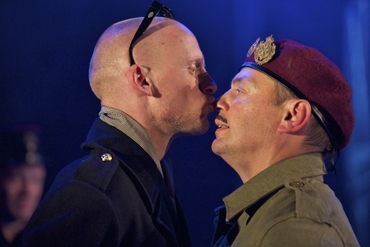Propeller
 Edward Hall’s all-male company Propeller has been responsible for some of the most distinctive and memorable Shakespeare productions of the last fifteen years, bringing a wonderfully fresh and vital aesthetic to the Bard’s tragedies, histories and comedies. Equal parts reverent and irreverent, Propeller’s wide-ranging approach combines imaginative physical elements with scrupulous attention to the text and has resulted in productions of often startling inventiveness, emotion and wit.
Edward Hall’s all-male company Propeller has been responsible for some of the most distinctive and memorable Shakespeare productions of the last fifteen years, bringing a wonderfully fresh and vital aesthetic to the Bard’s tragedies, histories and comedies. Equal parts reverent and irreverent, Propeller’s wide-ranging approach combines imaginative physical elements with scrupulous attention to the text and has resulted in productions of often startling inventiveness, emotion and wit.
Key to the company’s success has been its versatile ensemble of actors. The set-up works like this: once an actor has created a part in a production he automatically receives an offer of a role in the next play. Inevitably, some have chosen to move on, but among those who’ve stayed is Chris Myles who has appeared in every single one of the company’s major productions since 1997.
Among a multitude of diverse roles he’s been a fishnet-stocking-clad Maria in Twelfth Night, a befuddled, bowler-hatted Vincentio in The Taming of the Shrew and a whip-cracking, lavender-booted Abbess arriving to a chorus of “Heaven (Is A Place On Earth)” in The Comedy of Errors. He’s also met a memorably gory end as Buckingham in Richard III and flung a scarf in the face of yours truly as a rabble-rousing Nerissa in The Merchant of Venice. He’s currently to be seen doubling as a Montgomery-inspired Exeter and a wry Alice in Henry V, and as Camillo in The Winter’s Tale. As the company prepared for their week’s run at the Lowry Theatre in Salford I spoke to Chris about his time with Propeller and what keeps him on board.
It is, he says, the company’s collaborative ethos and its spirit of “inclusiveness” that he finds especially appealing. “Ed’s rehearsal process is different to that of a lot of other directors. In traditional rehearsals, you meet at the read-through and then work on your individual scenes. With Propeller you’re in every day and you feel completely included in the whole process. If you don’t have lines in a scene you’ll be given something to do, whether it’s banging on a pot or playing the flute. And when it comes to ideas we can all pitch in and contribute.
“It’s a bit like Henry, in a way. Ed’s the leader; we’re the troops. But he values our input. It really does create this instant camaraderie. In addition, we’re all on the same money, so there’s none of that ‘Oh, your agent got you a better deal than mine did, did they?’”
That inclusiveness also extends to performance and the company’s interaction with the audience. “We always seek out moments where we can move through the auditorium, or appeal to the audience directly, finding ways to include and involve them.”
Discussing the wide mix of influences and references that makes Propeller’s work so exciting, Myles affirms that it’s always “about telling the story. For example, The Pogues song [‘A Pair of Brown Eyes’] in Henry. That line: ‘But when we got back, labeled parts one to three…’ The Chorus wants to tell the story of a hero, and this song speaks about the experience of war. Again, anything is permissible—o long as it serves the story that we’re telling.”